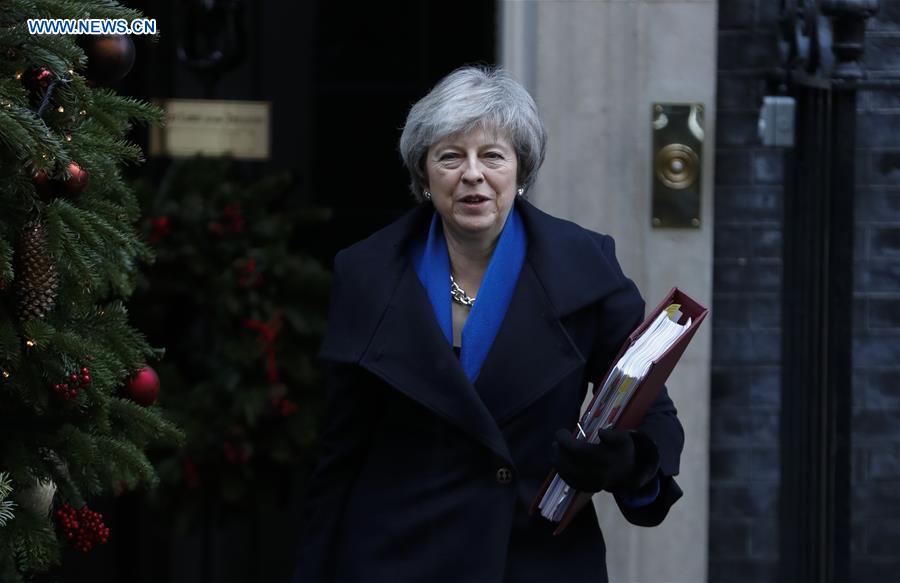Britain's political paralysis continues
- By Heiko Khoo
 0 Comment(s)
0 Comment(s) Print
Print E-mail China.org.cn, January 3, 2019
E-mail China.org.cn, January 3, 2019

Britain is due to leave the European Union (EU) on March 29. The Withdrawal Agreement negotiated by Theresa May's Conservative government is likely to be defeated in Parliament. Many in May's own party – both Brexiters and Remainers – have said they will vote against the deal. The dissent even reached May's own cabinet. On Nov. 15, 2018, Dominic Rabb (the minister responsible for negotiating the deal) resigned in protest at the deal. The main point of contention surrounds the so-called "Northern Ireland backstop." If Britain exits under the terms of the Withdrawal Agreement, Northern Ireland will maintain an open border with the Irish Republic – in effect retaining de-facto membership of the EU – while the rest of the United Kingdom operates according to new customs and trading relations.
Such an agreement is unacceptable to the Conservative party's Northern Irish partner the Democratic Unionist party (DUP) which guarantees the government its working majority. Meanwhile, the European Research Group (ERG) led by Jacob Rees-Mogg MP is also implacably opposed to the deal. Rees-Mogg instigated a vote of no-confidence in May's leadership of the Conservative party which was held on Dec. 13. May won the vote amongst Conservative parliamentarians by 83 votes. However, although she secured 200 votes, 117 of her MPs voted against her. Opposition to her leadership would have been even greater had she not, at the last minute, promised to resign before the next election. This promise to relinquish her leadership within a couple of years guarantees that internal party conflicts will continue to sap away at her authority.
Over the next few weeks, May will be doing her best to adjust elements of the deal in order to win over the DUP, and thereby neutralize the Irish question. If she is able to buy the acquiescence of the DUP then her focus will be to defuse Rees-Mogg and the ERG. Rees-Mogg has consistently called for a more militant negotiating stance. In his view, leaving the EU without a deal on March 29 would not produce a catastrophe. Furthermore, he believes that by threatening a no-deal scenario, the leadership of the EU would be forced to make greater concessions. It is certainly true that as things stand, the government's negotiating position with the EU is rather weak.
May will therefore be making offers to her backbench opponents in a desperate bid to stave off the threat that her agreement will be voted down, which seems likely. Following this, a Labour Party motion of no-confidence in the government could lead to an imminent general election. Indeed, it would only require 10 to 15 Conservative and DUP MPs to support such a motion for the government to be defeated. But this scenario seems unlikely given that Labour would likely win an imminent general election.
Given the conflict both within the ruling party and in the government's coalition with the DUP, it is extremely difficult to predict how things will develop before March 29 arrives.
It is entirely possible that Britain may unilaterally retract its decision to leave the EU. Certainly, for many who despise the consequences of the Brexit vote in 2016, this would be a welcome decision. Nevertheless, it seems inconceivable that Conservative party MPs could stomach such a maneuver, which they and their base, would regard as an utter betrayal.
There is substantial support for a new referendum. Those who advocate such a proposal state that because Parliament and the government have been unable to break the deadlock, the public should be allowed a final say on May's deal. Such a "final say" or "people's vote" has been strongly supported by those who voted to remain in the EU. This idea has also gained widespread support on the opposition benches of parliament. Many Labour MPs would prefer a referendum to a general election. However, it is highly implausible that a referendum could be called before the March 29. So even if a referendum were backed by a parliamentary majority, it would require that the Brexit date be delayed to accommodate such a "people's vote."
Heiko Khoo is a columnist with China.org.cn.
For more information please visit:http://china.org.cn/opinion/heikokhoo.htm
Opinion articles reflect the views of their authors, not necessarily those of China.org.cn.





